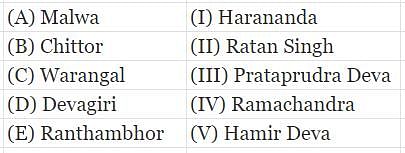UPSC Exam > UPSC Tests > Satish Chandra Test: The Delhi Sultanate- 2 - UPSC MCQ
Satish Chandra Test: The Delhi Sultanate- 2 - UPSC MCQ
Test Description
10 Questions MCQ Test - Satish Chandra Test: The Delhi Sultanate- 2
Satish Chandra Test: The Delhi Sultanate- 2 for UPSC 2024 is part of UPSC preparation. The Satish Chandra Test: The Delhi Sultanate- 2 questions and answers have been prepared
according to the UPSC exam syllabus.The Satish Chandra Test: The Delhi Sultanate- 2 MCQs are made for UPSC 2024 Exam.
Find important definitions, questions, notes, meanings, examples, exercises, MCQs and online tests for Satish Chandra Test: The Delhi Sultanate- 2 below.
Solutions of Satish Chandra Test: The Delhi Sultanate- 2 questions in English are available as part of our course for UPSC & Satish Chandra Test: The Delhi Sultanate- 2 solutions in
Hindi for UPSC course.
Download more important topics, notes, lectures and mock test series for UPSC Exam by signing up for free. Attempt Satish Chandra Test: The Delhi Sultanate- 2 | 10 questions in 12 minutes | Mock test for UPSC preparation | Free important questions MCQ to study for UPSC Exam | Download free PDF with solutions
Satish Chandra Test: The Delhi Sultanate- 2 - Question 1
Who was the first Caliph as well as the founder of the Umayyad dynasty of the Caliphate?
Detailed Solution for Satish Chandra Test: The Delhi Sultanate- 2 - Question 1
Satish Chandra Test: The Delhi Sultanate- 2 - Question 2
During the reign of which Delhi Sultan did the “Chahalgani” or “Chalisa’ come into existence?
Detailed Solution for Satish Chandra Test: The Delhi Sultanate- 2 - Question 2
| 1 Crore+ students have signed up on EduRev. Have you? Download the App |
Satish Chandra Test: The Delhi Sultanate- 2 - Question 3
Whom did Mahmud of Ghazni defeat to conquer and annex Peshawar and Punjab?
Satish Chandra Test: The Delhi Sultanate- 2 - Question 4
During Firuz Tughlaq’s long reign of 40 years, there was only one rebellion by a noble. Who was he?
Detailed Solution for Satish Chandra Test: The Delhi Sultanate- 2 - Question 4
Satish Chandra Test: The Delhi Sultanate- 2 - Question 5
Who was the court poet of Mahmud of Ghazni and author of Shah Namah?
Satish Chandra Test: The Delhi Sultanate- 2 - Question 6
Who among the following Delhi Sultans did not go for any fresh conquests?
Detailed Solution for Satish Chandra Test: The Delhi Sultanate- 2 - Question 6
Satish Chandra Test: The Delhi Sultanate- 2 - Question 7
The historical works of which two historians of the Delhi Sultanate have Tarikh-i-Firuzshahi as their title?
I. Amir Khusrau
II. Minhas-us-Siraj
III. Ziauddin Barani
IV. Shams-i-Siraj Afif
Satish Chandra Test: The Delhi Sultanate- 2 - Question 8
Out of all the following who was born to a Hindu mother?
Detailed Solution for Satish Chandra Test: The Delhi Sultanate- 2 - Question 8
Detailed Solution for Satish Chandra Test: The Delhi Sultanate- 2 - Question 9
Detailed Solution for Satish Chandra Test: The Delhi Sultanate- 2 - Question 10
Information about Satish Chandra Test: The Delhi Sultanate- 2 Page
In this test you can find the Exam questions for Satish Chandra Test: The Delhi Sultanate- 2 solved & explained in the simplest way possible.
Besides giving Questions and answers for Satish Chandra Test: The Delhi Sultanate- 2, EduRev gives you an ample number of Online tests for practice
Download as PDF



















